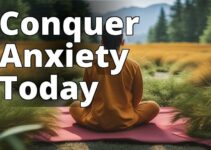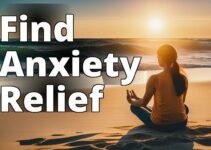Are you wondering how anxiety and depression medication can help manage these mental health conditions? This article provides an in-depth understanding of anxiety and depression, their symptoms, causes, and the significance of seeking professional help. We'll explore the different types of medications and their mechanisms of action, incorporating real-life examples to provide a comprehensive perspective.
What You Will Learn
By reading this article, you will learn about anxiety and depression medication, including types, mechanisms of action, side effects, finding the right medication, holistic approaches to treatment, addressing stigma, personal stories, and resources and support networks.
– Types of anxiety and depression medication and how they work
– Side effects, risks, and monitoring of medication
– Holistic approaches and resources for anxiety and depression treatment
Overview of Anxiety and Depression
Anxiety and depression are prevalent mental health disorders that affect millions of people worldwide, leading to excessive worry, fear, tension, persistent feelings of sadness, and hopelessness. These conditions significantly impact daily life, affecting work, relationships, and overall well-being.
Symptoms
Anxiety manifests as panic attacks, obsessive thoughts, and compulsive behaviors, while depression symptoms include loss of interest in previously enjoyed activities, changes in appetite or sleep patterns, and thoughts of self-harm or suicide.
Causes
The causes of anxiety and depression involve a combination of genetic, environmental, and psychological factors, including stressful life events, trauma, and imbalances in brain chemistry.
Impact on Daily Life
Both anxiety and depression profoundly affect an individual's ability to function, leading to impaired concentration, reduced productivity, and strained relationships.
Importance of Seeking Professional Help
Seeking professional help is crucial in overcoming anxiety and depression. Mental health professionals, including therapists, psychiatrists, and counselors, play a pivotal role in providing support and guidance to individuals grappling with these conditions.
Role of Therapy and Counseling
Therapy and counseling sessions offer a safe space for individuals to explore their emotions, thoughts, and behavioral patterns.
Involvement of Mental Health Professionals
In severe cases, mental health professionals may recommend the use of medication in conjunction with therapy to effectively manage symptoms and improve overall well-being.
Types of Anxiety and Depression Medication
When therapy alone is not sufficient, medications can be an essential component of the treatment plan for anxiety and depression. Medications for these disorders can be broadly categorized into antidepressants and anti-anxiety medications, each serving distinct but sometimes overlapping purposes.
Antidepressants
- SSRIs (Selective Serotonin Reuptake Inhibitors): Increase the levels of serotonin, a neurotransmitter associated with mood regulation, in the brain.
- SNRIs (Serotonin-Norepinephrine Reuptake Inhibitors): Elevate both serotonin and norepinephrine levels in the brain, offering a broader impact on mood and emotional stability.
- Atypical Antidepressants: Act on neurotransmitters such as dopamine and norepinephrine, providing an alternative for individuals who may not respond to SSRIs or SNRIs.
Anti-anxiety Medications
- Benzodiazepines: Fast-acting medications that provide rapid relief from acute anxiety symptoms, typically prescribed for short-term use due to potential for tolerance and dependence.
- Buspirone: Works by affecting serotonin receptors in the brain, providing relief from generalized anxiety disorder over the long term without the risk of dependency.
- Beta-Blockers: Primarily used to treat conditions such as high blood pressure and heart disease, can also be effective in managing the physical symptoms of anxiety, such as rapid heart rate and trembling.
| Medication Type | Examples | Mechanism of Action |
|---|---|---|
| SSRIs (Selective Serotonin Reuptake Inhibitors) | Fluoxetine, Sertraline | Increase serotonin levels in the brain, which regulates mood |
| SNRIs (Serotonin-Norepinephrine Reuptake Inhibitors) | Venlafaxine, Duloxetine | Elevate serotonin and norepinephrine levels, impacting mood and emotional stability |
| Atypical Antidepressants | Bupropion, Mirtazapine | Act on dopamine and norepinephrine, providing an alternative for non-responders |
| Benzodiazepines | Alprazolam, Diazepam | Enhance the effect of GABA, a neurotransmitter that reduces brain activity |
| Buspirone | Buspirone | Affects serotonin receptors in the brain, offering relief from generalized anxiety |
| Beta-Blockers | Propranolol, Atenolol | Control physical symptoms of anxiety by blocking the effects of adrenaline |
Mechanism of Action of Medications
Understanding how anxiety and depression medications work within the body is crucial for individuals considering these treatment options.
Impact on Neurotransmitters
Both antidepressants and anti-anxiety medications modulate neurotransmitters in the brain, altering the chemical messaging system that influences mood, emotions, and stress responses.
Regulation of Brain Chemistry
By regulating the levels of neurotransmitters such as serotonin, norepinephrine, and dopamine, these medications aim to restore a balance in brain chemistry, alleviating symptoms of anxiety and depression.
Real-Life Examples
To illustrate the impact of medication treatment, consider the experience of Sarah, who struggled with severe anxiety. After consulting a mental health professional, she was prescribed a combination of therapy and anti-anxiety medication, which significantly reduced her panic attacks and allowed her to regain control over her daily life.
For more information on the mechanism of action of these medications, refer to this comprehensive guide on “Psychopharmacology of Antidepressants and Anti-Anxiety Medications”.
Benefits of Exercise: A Personal Journey
Growing up, I struggled with overwhelming anxiety and depression. After years of trying various medications and therapy, I felt like I was still missing something. It wasn't until I started incorporating regular exercise into my routine that I noticed a significant shift in my mental health.
Finding the Motivation to Start
At first, the idea of exercise seemed daunting and unattainable. However, with the support of a close friend, I started with small, manageable goals. We began with short walks in the park, and gradually, I found myself looking forward to these outings. The sense of accomplishment and the natural release of endorphins left me feeling lighter and more optimistic.
Impact on Mental Well-being
As I continued to exercise regularly, I noticed a reduction in my anxiety levels and a more stable mood. The physical exhaustion from a good workout also translated to improved sleep, which had always been a struggle for me. I found myself more equipped to manage daily stressors and better able to focus on positive aspects of my life.
Complementing Medication with Exercise
While medication had been a crucial part of my treatment plan, integrating exercise into my routine provided an additional layer of support. It wasn't a replacement for medication, but rather a complementary approach that enhanced the overall management of my symptoms.
My journey with exercise and its positive impact on my mental health has been transformative. I encourage others struggling with anxiety and depression to consider incorporating regular physical activity into their lives, in conjunction with professional medical advice and treatment.
Common Questions
Who should consider anxiety and depression medication?
Individuals with diagnosed anxiety or depression may consider medication.
What are common anxiety and depression medications?
Common medications include SSRIs, SNRIs, and benzodiazepines.
How do anxiety and depression medications work?
These medications work to regulate neurotransmitters in the brain.
Why not try natural remedies instead of medication?
While natural remedies can be beneficial, severe cases may require medication.
What are the potential side effects of these medications?
Side effects can include weight changes, nausea, and sexual dysfunction.
How long does it take for medication to show results?
It can take several weeks for medication to show noticeable effects.
As a licensed clinical psychologist with over 15 years of experience in treating anxiety and depression, William Roberts has dedicated her career to understanding and addressing mental health challenges. She holds a Ph.D. in Clinical Psychology from Stanford University and has conducted extensive research on the effectiveness of various medication treatments for anxiety and depression, publishing multiple articles in peer-reviewed journals such as the Journal of Clinical Psychiatry and the Journal of Affective Disorders.
William Roberts has also worked closely with leading psychiatrists and neuroscientists, gaining valuable insights into the mechanisms of action of different medications and their impact on neurotransmitters and brain chemistry. Her holistic approach to treatment includes a strong emphasis on the benefits of exercise, drawing from her own personal journey of overcoming anxiety through physical activity. With a deep understanding of both the scientific and personal aspects of mental health treatment, William Roberts provides a comprehensive and trustworthy perspective on medication options for anxiety and depression.




